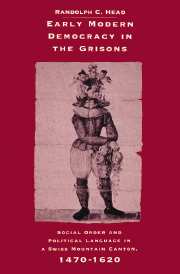 Early Modern Democracy in the Grisons
Early Modern Democracy in the Grisons Book contents
- Frontmatter
- Contents
- List of illustrations
- List of tables
- Acknowledgments
- Note on languages, orthography, and translations
- Abbreviations
- INTRODUCTION: Social order, politics, and political language in Graubünden, 1470–1620
- 1 Communalism and other political models in Europe and in Graubünden
- 2 Graubünden to 1520: geography, society, history
- 3 Local practice and federal government in the Freestate
- 4 From consolidation to communal politics: the Freestate, ca. 1530–1580
- 5 Elite power and popular constraint in sixteenth-century Rhaetia
- 6 Reform, communal action and crisis, ca. 1580–1639
- 7 Political language and political cosmology during the crisis years
- CONCLUSION: Democracy in early modern Graubünden
- Bibliography
- Index
- CAMBRIDGE STUDIES IN EARLY MODERN HISTORY
6 - Reform, communal action and crisis, ca. 1580–1639
Published online by Cambridge University Press: 14 October 2009
- Frontmatter
- Contents
- List of illustrations
- List of tables
- Acknowledgments
- Note on languages, orthography, and translations
- Abbreviations
- INTRODUCTION: Social order, politics, and political language in Graubünden, 1470–1620
- 1 Communalism and other political models in Europe and in Graubünden
- 2 Graubünden to 1520: geography, society, history
- 3 Local practice and federal government in the Freestate
- 4 From consolidation to communal politics: the Freestate, ca. 1530–1580
- 5 Elite power and popular constraint in sixteenth-century Rhaetia
- 6 Reform, communal action and crisis, ca. 1580–1639
- 7 Political language and political cosmology during the crisis years
- CONCLUSION: Democracy in early modern Graubünden
- Bibliography
- Index
- CAMBRIDGE STUDIES IN EARLY MODERN HISTORY
Summary
You'll say that the cause of such inconstancy is the form of our republic, which is made up of democracy and oligarchy mixed together.
Johannes Fabricius, 1558Born during the brief era around 1500 when the Swiss were more than mere pawns on the European stage, the Rhaetian Freestate flourished during the sixteenth century, while France, Germany, and Austria were all distracted by fragmentation and religious discord. By the end of the century, however, the international climate in Europe had changed. France, no longer torn by civil war, renewed its struggle with the Habsburg empire in Spain and in Austria, which was itself overcoming internal weaknesses. After the Peace of Augsburg of 1555, moreover, tension between Catholics and Protestants in Germany rose, exacerbated by Calvinism's growing potency. As confessional camps consolidated, the lines of conflict between them became clearer and more likely to align with great-power struggles over territory and trade. The polarized European world of 1600 presented new dangers to a small and strategically located state like the Rhaetian Freestate. Growing social and ideological tension within the Freestate became inextricably linked with larger battles between Habsburg and Valois, and between Catholic and Protestant all over Europe, nearly destroying the Freestate in the process.
The Freestate's own political history after 1550 proceeded within the frameworks built up over the previous century or so: the institutional framework outlined in 1525 and 1526, and the conceptual framework of values found in Rhaetian political rhetoric.
- Type
- Chapter
- Information
- Early Modern Democracy in the GrisonsSocial Order and Political Language in a Swiss Mountain Canton, 1470–1620, pp. 168 - 198Publisher: Cambridge University PressPrint publication year: 1995


